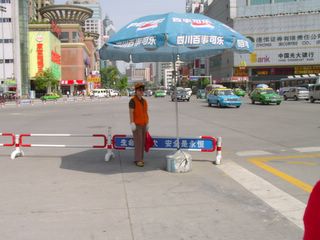From Pittsburgh City Paper, March 22, 2006The March 14, 2006, special election of a new city councilor from District 3 didn't lack for passion: Two candidates nearly got into a fistfight on Election Day.
But voters apparently felt less strongly about the contest to replace former council member Gene Ricciardi, whose district includes the South Side, adjoining hilltop communities, and portions of Oakland. According to unofficial returns, 3,349 votes were cast -- a turnout of under 14 percent. There were few surprises. The endorsed Democrat, Arlington resident and public-works employee Jeffrey Kock, trumped the eight-man field with 1,449 votes. That edged out South Side businessman, Bruce Kraus, who polled 1,271 votes.
"I was surprised by how close Kraus got," says Koch. "But I just knew more people."
And as Kraus backers had feared, Bruce Krane, another South Side businessman, drew critical votes away. Krane won 215 votes, roughly three dozen more than Kraus would have needed to win.
An altercation between Krane and Kraus was, in fact, narrowly averted on the University of Pittsburgh campus. Witnesses say the dispute, in which the candidates argued over last-minute efforts to appeal to voters, nearly came to blows.
Krane confirms a confrontation took place, and acknowledges warning Kraus to leave "before your teeth end up on the ground." Kraus declined comment on the fracas.
"Votes got split," says Khari Mosley, the local head of the League of Young Voters. All along, grassroots progressives worried that Koch was too close to the Democratic old guard. But they didn't rally behind Kraus until a Feb 12 candidates' forum held by Progress Pittsburgh and other groups. By then, "The race had gotten personal," Mosley says. "By the time people started talking about narrowing the field, it was too late."
Krane says that Kraus supporters claimed "I was put in the race by (Mayor Bob) O'Connor. ... No one who knows me has ever questioned my independence." But, he adds, "Call me a spoiler if you like; it's OK with me."
Kraus declines to do so. "Krane took some votes," he says, "but we had everything working against us. We lost the (Democratic) endorsement; we were the last name on the ballot. God knows there were enough other candidates on the ballot. ... But as a first-time candidate, we did well.
There had been hopes that Pitt students, who live on the district's Oakland outskirts, might play a decisive role. But despite a get-out-the-vote effort Mosley's organization targeted at students, only 93 votere were cast at Pitt's Posvar Hall polling place.
The League of Young Voters sought to register 1,000 students for the election; Mosely hoped 300 would vote. "It was an ambitious goal," Mosley says. But I'm disappointed we didn't reach it."
Still, Mosley observes, "Many districts had fewer votes than Pitt did." And even that, organizers contend, is a step forward.
"Students showed up in suprising numbers, given the extent to which they were ignored," says Andrea Boykowicz, an Oakland resident and member of Progress Pittsburgh. The candidates focused on issues such as litter and graffiti, which she says didn't resonate with students.
Koch will hold office only for 18 months, to fill out the rest of Ricciardi's term. His top legislative priority? "The same thing I said all along: trying to get Warrington Avenue repaved." As for the majority of voters who picked someone else, "I need to convince them that they made the wrong choice."
Neither Krane nor Kraus will say whether they plan to run again. But Boykowicz will be watching.
"Kraus made a respectable showing," she says. "He could run again, and I'll be intereted to see if he makes his platform more meaningful. If not, there are other people we can run."
-- by Chris Potter








